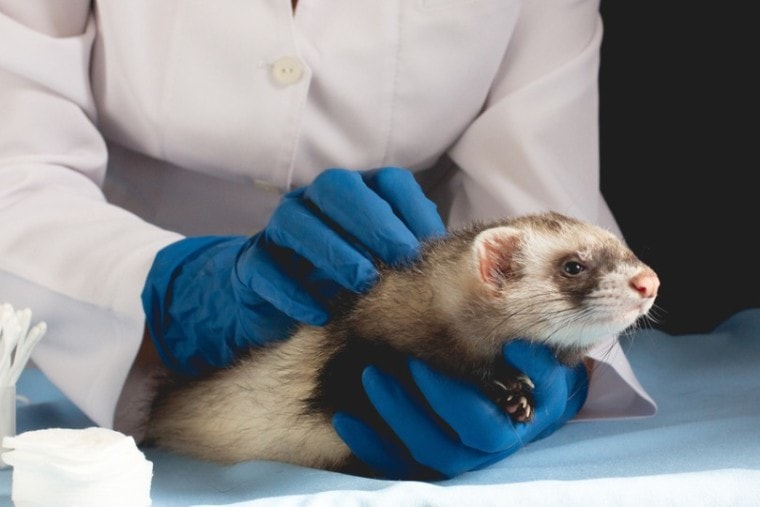
How Many Vaccines Do Ferrets Need?
Vaccines for canine distemper and rabies are both recommended annually for ferrets.
Rabies
Rabies is a viral disease every pet owner fears because it is a zoonosis, which means it can be transmitted from animals to humans. All mammals are susceptible to rabies and that is why ferrets are also on the list for vaccination against rabies. The first shot should happen once a ferret is around 12 weeks of age. If you aren’t sure of the exact date of birth, some veterinarians can wait a week or two to give the shot just to be sure the ferret is old enough. After the first shot is done, you need to do it again every year.

Canine Distemper
Canine distemper is another viral disease a ferret will need a vaccine against. Your ferret should get a series of three shots throughout their first year. That means the first shot should be around 6-8 weeks, the booster shot around 10-12 weeks, and the third one at 14-16 weeks of age. After that, the next shot is after they are more than one year, and it should be given each year as long as the ferret is alive.
The Best Vaccinations For Ferrets
You, as a ferret owner, don’t have to choose the vaccination for your ferret, that is the job and responsibility of your vet. At the moment, in the USA there are two approved vaccines against rabies for ferrets and one against canine distemper.
Each of those vaccines is well known by knowledgeable ferret veterinarians, so you can ask for more information in the veterinary clinic recommended by other ferret owners or local ferret shelters. They will explain to you when, where, and which one they will choose.

Why Vaccinate Ferrets Against Rabies and Canine Distemper?
Here is more information about rabies and canine distemper that should clarify why these shots are important for your ferret’s health.
Rabies Information
We all know about rabies because it is a danger for different animals and pets. Rabies is a virus transmitted through a bite or a scratch of an infected animal and it usually leads to death.
When we look at the history and statistics, there aren’t many ferrets that have gotten rabies in the first place. One of the reasons why there aren’t that many rabies cases in ferrets is because most ferrets die a few days after catching rabies.
Most ferrets are indoor animals, which means they don’t go outside. You don’t have to walk them and the only reason to take them out is to go to the vet. Even in that case, they will spend the time outside safely stowed away in their carrier. This setup lowers the chance of a ferret catching rabies from an infected animal, especially if you don’t have cats or dogs that go outside on a daily basis. But, that doesn’t mean you shouldn’t vaccinate your ferret.

Legal Reasons for Vaccinations
If your ferret scratches or bites another person or pet, you may have to prove that a ferret is vaccinated against rabies for legal reasons. So, if you don’t vaccinate your ferret and he scratches or bites another pet or human, the authorities can legally take away your pet from you and put it in quarantine, or worse. If you don’t have proof of vaccination, it doesn’t matter whether your ferret has rabies or not.
Rabies Symptoms
It is smart to know rabies symptoms, even though there is a small chance your ferret has it. The first signs of rabies in ferrets are nervousness and overreaction to ordinary stimuli (sounds, movements). After that, your ferret can experience disorientation, lethargy, defensiveness especially if he is in his cage (his territory).
After that, your ferret can produce too much saliva, making him drool on everything around him. One of the last symptoms of rabies is aggression toward everyone and everything, no matter who is around him. After that, your ferret can gradually lose control over his body, then it can have seizures until death eventually arrives.
Canine Distemper
Canine distemper is a much more dangerous disease that affects dogs, wolves, foxes, and many other animals. It is a fatal disease, especially in ferrets. That is why it is very important to vaccinate your ferret against canine distemper. There is almost a 100% mortality rate of canine distemper for ferrets and once a ferret catches it, there is no cure. Vaccination is the only defense against it.
There are many ways for your ferret to catch canine distemper. It is an airborne virus, which means it is enough for a ferret to be near an infected animal or get in touch with any bodily fluids from that animal. Even scarier, you can unintentionally infect your ferret with canine distemper because you can bring it in your home on shoes, jackets, or clothes. That is why it is strongly recommended not to wear shoes in your home and change your clothes once you arrive home. But also, getting the vaccine will allow you to relax in this regard.
Incubation Period
The incubation period of canine distemper is 7-10 days. That is why it is smart to quarantine your new pet for 10-14 days so you can be sure the pet is 100% healthy. Only then can you introduce him to the rest of the animal kingdom you have in your home. The important fact about canine distemper is that the symptoms are developed much faster in younger ferrets than in older ones. That means that a young ferret can die within days after developing symptoms.

Canine Distemper Symptoms
A few of the most common signs of canine distemper are conjunctivitis and discharge from one or both eyes. That discharge can be yellow or green. It is usually followed by a fever and severe lethargy. The most recognizable canine distemper symptom comes after a few days and it is in the form of thickening skin on some parts of the body. The chin, lips, anal, and inner upper thigh develop the lesion first. Then, as those lesions develop they become crusts, and footpads harden too. After that, your ferret may experience a severe bacterial infection or brain damage that eventually leads to death. Other not-so-common symptoms are nausea, diarrhea, seizures, etc.

What Are Risks of Vaccine Reactions?
There is always a risk of a negative reaction to any vaccine. The same story is with ferrets as pets, but it can happen more often than in cats or dogs. We don’t know the reason for those allergic reactions and we can’t know which ferret will have them. That is why it is important to stay near the vet clinic at least half an hour after vaccination. If your ferret experiences an allergic reaction, you can react quickly and your vet can help your ferret.
To avoid triggering allergic or any other bad reaction to vaccines, it is not recommended to vaccinate ferrets for both diseases at the same time. A good period between both vaccinations for rabies and canine distemper should be around two weeks (14 days).
Allergic Reactions To Vaccines
Some of the most common allergic reactions to vaccines are hives, itching, breathing difficulties, low blood pressure, low blood oxygen, even seizures.
If your ferret is prone to allergic reaction from a previous vaccination, then you should tell that to your veterinarian before he administers the shot. That way, your veterinarian can give your ferret something to minimize the reaction. The medicine depends on the type of reaction your ferret had before, his health, age, and a few other factors.

.jpg)
No comments:
Post a Comment